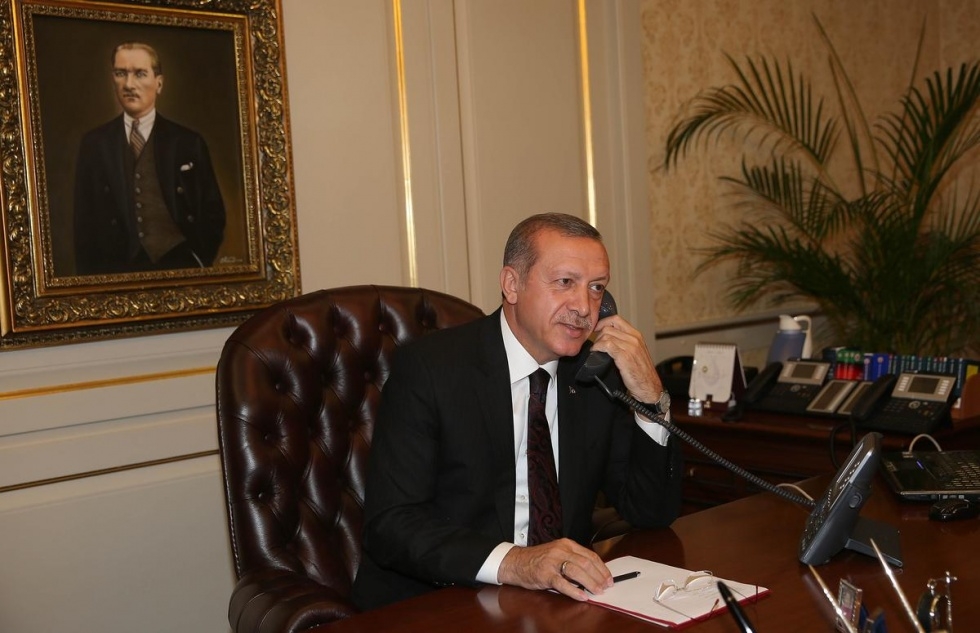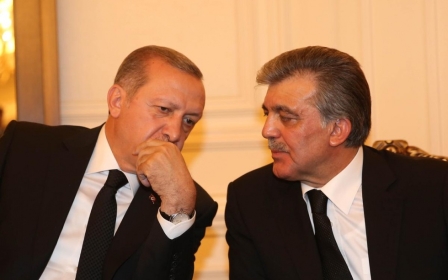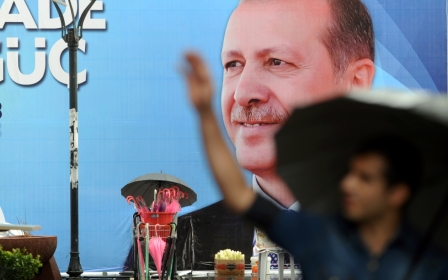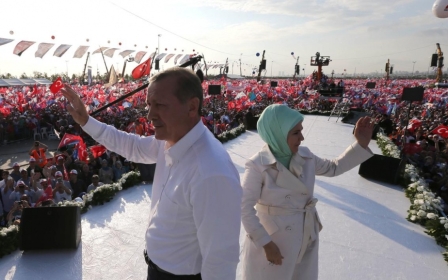All power to Erdogan

For the first time in Turkey's history, its president - the country's 12th - has secured the office by popular vote. This is no simple fact. Rather, it is a development that will fundamentally change the way governments are formed in Turkey. To appreciate the magnitude of this change, it is necessary to look at the powers vested in the president by the constitution.
Below are the related articles of the constitution.
Duties and powers:
ARTICLE 104 - The President of the Republic is the head of the State. In this capacity, he/she shall represent the Republic of Turkey and the unity of the Turkish Nation; he/she shall ensure the implementation of the Constitution, and the regular and harmonious functioning of the organs of the State.
To this end, the duties he/she shall perform, and the powers he/ she shall exercise, in accordance with the conditions stipulated in the relevant articles of the Constitution are as follows:
a) Those relating to legislation:
To deliver, if he/she deems it necessary, the opening speech of the Grand National Assembly of Turkey on the first day of the legislative year;
To summon the Grand National Assembly of Turkey, when necessary;
To promulgate laws;
To send laws back to the Grand National Assembly of Turkey to be reconsidered;
To submit to referendum, if he/she deems it necessary, laws regarding amendment to the Constitution;
To appeal to the Constitutional Court for the annulment part of whole or certain provisions of laws, decrees having the force of law and the Rules of Procedure of the Grand National Assembly of Turkey on the grounds that they are unconstitutional in form or in content;
To decide to renew elections for the Grand National Assembly of Turkey.
b) Those relating the executive:
To appoint the Prime Minister and to accept his/her resignation;
To appoint and dismiss ministers on the proposal of the Prime Minister;
To preside over the Council of Ministers or to call the Council of Ministers to meet under his/her chairpersonship whenever he/she deems it necessary;
To accredit representatives of the Turkish State to foreign states and to receive the representatives of foreign states appointed to the Republic of Turkey;
To ratify and promulgate international treaties;
To represent the Office of Commander-in-Chief of the Turkish Armed Forces on behalf of the Grand National Assembly of Turkey;
To decide on the use of the Turkish Armed Forces;
To appoint the Chief of the General Staff; To call the National Security Council to meet; To preside over the National Security Council;
To proclaim martial law or state of emergency, and to issue decrees having the force of law, by the decisions of the Council of Ministers under his/her chairpersonship;
To sign decrees;
To remit or commute the sentences imposed on certain individuals, on grounds of chronic illness, disability or old age;
To appoint the members and the chairperson of the State Supervisory Council;
To instruct the State Supervisory Council to carry out inquiries, investigations and inspections;
To appoint the members of the Council of Higher Education;
To appoint president of universities.
c) Those relating to the judiciary:
To appoint the members of the Constitutional Court, one- fourth of the members of the Council of State, the Chief Public Prosecutor and the Deputy Chief Public Prosecutor of the High Court of Appeals, the members of the High Military Court of Appeals, the members of High Military Administrative Court and the members of the High Council of Judges and Prosecutors.
The President of the Republic shall also exercise powers of election and appointment, and perform the other duties conferred on him/her by the Constitution and laws.
Presidential accountability and non-accountability:
ARTICLE 105 - All presidential decrees, except those which the President of the Republic is empowered to enact individually without the signatures of the Prime Minister and the minister concerned in accordance with the provisions of the Constitution and other laws, shall be signed by the Prime Minister and the ministers concerned; the Prime Minister and the minister concerned shall be accountable for these decrees.
No appeal shall be made to any judicial authority, including the Constitutional Court, against the decisions and orders signed by the President of the Republic on his/her own initiative.
The President of the Republic may be impeached for high treason on the proposal of at least one-third of the total number of members of the Grand National Assembly of Turkey, and by the decision of at least three-fourths of the total number of members.
Those who pay any attention to the articles above will see that presidency is not merely symbolic or ceremonial - though it has until now indeed appeared to be so, for reasons set out below.
It is precisely because of this that every election up until the 2014 presidential elections in Turkey brought its own crisis. In fact, the constitutional amendment that allowed for presidential elections was passed due to a crisis in the 2007 elections.
The parliament was to elect a president in 2007. The AK Party nominated its candidate, Abdullah Gul. In a twist that disgraced the rule of law, a never heard of before article suddenly appeared. The military and judiciary forces were putting on the pressure. The rule they invented was going to be known as the "367 rule". The whole thing was outrageous.
According to the 102nd article of the constitution at the time, the president could be elected with a maximum of four parliamentary rounds of voting. The decisional quorum was a qualified majority of two-thirds (367 votes) of full membership for the first two rounds, and an absolute majority (267 votes) for the third and fourth rounds.
The constitution contained no special quorum rule for the meeting of the parliament (in which case article 96 would apply - one-third of the membership, 184 votes).
The legally dubious argument put forward was that the qualified majority of 367 votes was not only the decisional quorum but was also the necessary quorum for the opening of the session. The argument effectively prevented the majority party with 354 seats in the parliament to elect the next president of Turkey.
On the evening of the first round, April 27, 2007, the military issued a memorandum. This was, in effect, a disguised coup. The military believed that the threat of a disguised coup would be enough for the AK Party to retreat.
Then, something that had never happened in Turkish history before happened. Erdogan responded to the disguised threat with the same force it was issued. He announced that the government would seek early elections, as well as a referendum to amend the constitution so the president could be elected by popular votes.
The qualified majority quorum was reached when the Nationalist Movement Party won some seats in the early elections, and Abdullah Gul was elected as the next president of Turkey. The military-judiciary tutelage regime, confounded by the unexpected respond, had to retreat.
This is the story that allowed for Recep Tayyip Erdogan to be elected as the next president by the peoples’ votes on 10 August.
The country reached a point in which it has a president vested with a wide range of powers supported by a number of votes that exceeds the constituency of the most powerful political party of the country.
In the past, presidents made partial use of the powers vested in them because the military tutelage regime had enough control over the governments already formed before the president was elected in parliamentary rounds. The president intervened only when the tutelage regime did not want to get its hands dirty. As such, the office of the president had served as the power center of the Kemalist regime.
Erdogan, as an elected president, intends to make use of all the powers vested in him both by constitution and people.
All the calls he made to the opposition parties for cooperation in correcting this situation went unheard. Erdogan reiterated time and again that the office of the presidency in Turkey was, in effect, a presidential system. He called for a structural change that would clarify the powers of separation. He suggested a presidential, semi-presidential, or multi-party presidential system (which was the system in place until the coup of 1960) to be implemented in order to fix the ambiguity.
Without the support of the opposition, the necessary amendments could not be made. Now, the elected president and the government must work together to fix this situation. Until when you may ask? Until the necessary amendments to the constitution can be made.
- Taha Ozhan is the president of SETA Foundation at Ankara. He is an academic, writer and columnist for Star Daily and Daily Sabah. He appears on a weekly political debate show on national TV. He frequently comments and writes for international media. His latest book, Normalization Pains (2014), was about the Kurdish issue.
The views expressed in this article belong to the author and do not necessarily reflect the editorial policy of Middle East Eye.
Photo credit: : United States President Barack Obama calls Turkey's presidential election winner Recep Tayyip Erdogan (AA)
New MEE newsletter: Jerusalem Dispatch
Sign up to get the latest insights and analysis on Israel-Palestine, alongside Turkey Unpacked and other MEE newsletters
Middle East Eye delivers independent and unrivalled coverage and analysis of the Middle East, North Africa and beyond. To learn more about republishing this content and the associated fees, please fill out this form. More about MEE can be found here.





